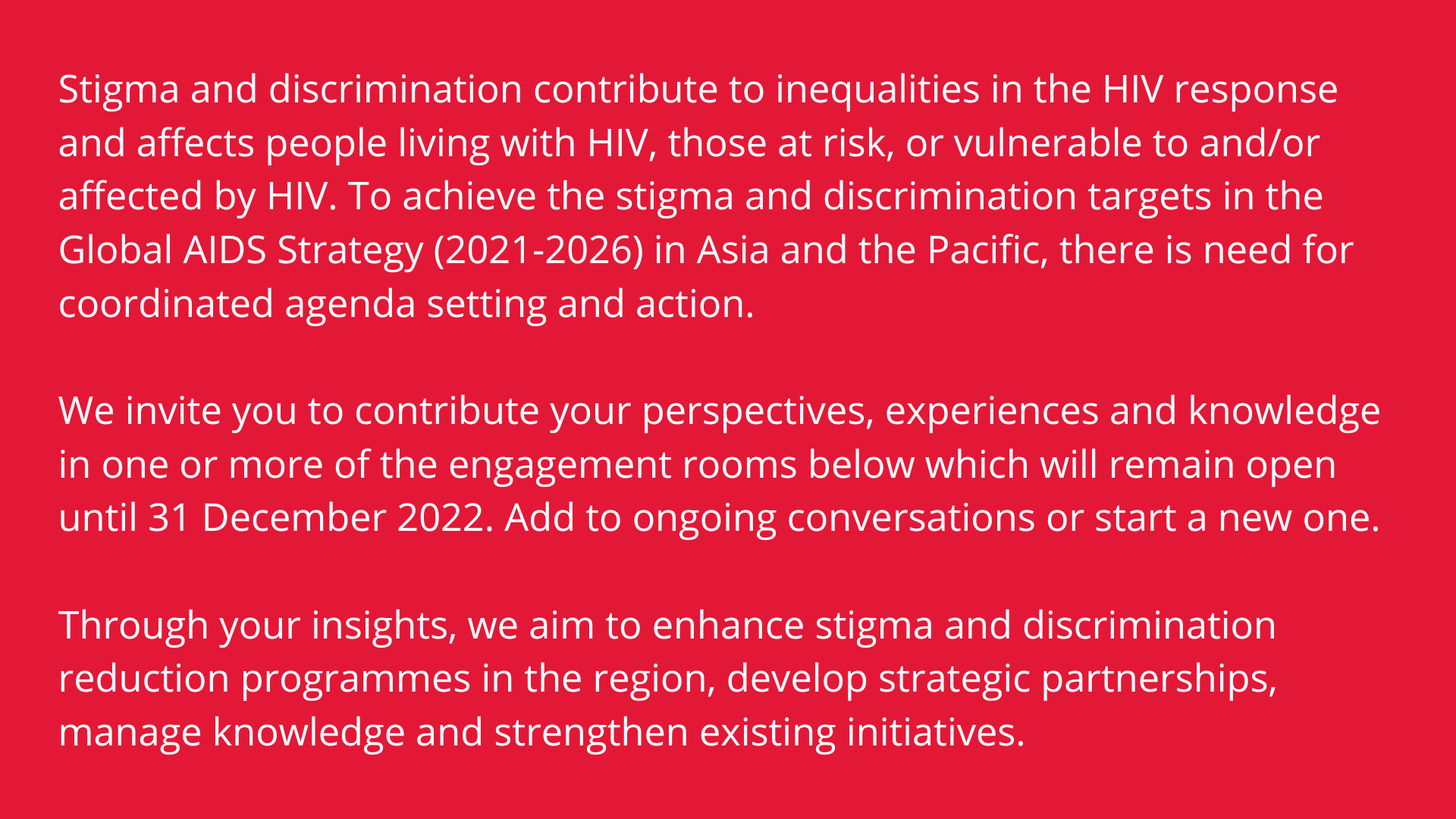Introduction
Welcome to the HIV-related Stigma and Discrimination Community of practice: Asia & Pacific Region. The objectives of the Community of Practice are to:
- facilitate stakeholder dialogue on reduction of HIV-related and intersecting forms of stigma and discrimination;
- identify and promote opportunities for collaboration and interdisciplinary initiatives, including program design and implementation, resource dissemination and generation of knowledge;
- develop and support relevant interdisciplinary and multistakeholder publications and materials on stigma and discrimination;
- exchange good practices and lessons learned at national and regional levels.
This Community of Practice is hosted by UNAIDS Regional Support Team for Asia and the Pacific.
Audience
All relevant stakeholders working in the HIV response in Asia and the Pacific region: communities of people living with or at risk of HIV and key populations; representatives from government ministries and other relevant government agencies at the national, regional, and local level; representatives from academia and research organizations; UN agencies; civil society groups; media professionals and other relevant stakeholders.
Engage in the Discussion Rooms

Objective
Despite decades of scientific and medical advances in prevention and treatment, as well as widespread awareness-raising efforts, irrational fears of HIV infection and negative attitudes towards people living with HIV are a persistent barrier to addressing the epidemic.
HIV-related stigma is apparent in negative attitudes, behaviours and judgements towards people living with HIV, their partners and families and key populations.
HIV-related discrimination is unfair and unjust treatment of a person or group of people based on their real or perceived HIV status. Discrimination also includes the unfair treatment of key populations including gay men, and other men who have sex with men, transgender people, sex workers, people who use drugs, women and girls and other groups at higher risk of acquiring HIV, such as mobile and migrant populations, and prisoners and other incarcerated people.
HIV-related discrimination can be compounded by other forms of discrimination including discrimination based on race, sex, socioeconomic status, sexual orientation, age, gender identity or national origin.
Result Area 5 of the Global AIDS Strategy (2021-2026) works towards ensuring people living with HIV, key populations and people at risk of HIV enjoy human rights, equality and dignity free of stigma and discrimination.
The Global Partnership for action to eliminate all forms of HIV-related Stigma and Discrimination established in 2018 following a call by the NGO Delegation to the UNAIDS Programme Coordinating Board works towards catalyzing and accelerating the implementation of commitments to end HIV-related stigma and discrimination. It is co-convened by UNAIDS, UN Women, UNDP, the Global Network of People living with HIV, the PCB NGO Delegation and the Global Fund to Fight AIDS, Tuberculosis and Malaria. Six settings have been prioritized, namely:
- Individual, household and community
- Healthcare
- Workplace
- Legal and justice systems
- Education
- Emergency and humanitarian.
Key populations and other vulnerable populations, for instance, experience heightened intersecting stigma and discrimination across all the six settings.
This Community of Practice aims to capture and disseminate knowledge and experiences as well as encourage innovative ideas and approaches to inform HIV-related stigma and discrimination intervention models and programming in the Asia and Pacific region, while considering each country's context and background.
Discussions will also articulate the need to address critical cross-cutting issues that perpetuate and reinforce HIV-related stigma and discrimination, including harmful gender, social and cultural norms; sexual and gender-based violence; the legal and policy environment; the impact of gender, social and economic inequalities; social protection policies; communication and the media and internalized and experienced stigma. Discussions will also focus broadly on all forms of stigma and discrimination experienced by groups vulnerable to HIV and how it affects their ability to prevent infection and access to HIV-related services, treatment and care.
This platform now seeks to narrow down effective, innovative, evidence-based and sustainable programmatic and policy options suitable for countries in the Asia and the Pacific region. Major outcomes of this initiative will be:
- Stakeholder dialogue on elimination of HIV-related Stigma and Discrimination;
- Stakeholder collaboration on interdisciplinary initiatives including on programme design and implementation;
- Development of knowledge products and materials on elimination of HIV-related stigma and discrimination;
- Peer learning and exchange of good practices and lessons learnt.
More Information
- For more information about UNAIDS work in Asia and the Pacific region, visit https://www.unaids.org/en/regionscountries/asiaandpacific
- We commit to protect the identities of those who require it. To comment anonymously, please select "Comment anonymously" before you submit your contribution. Alternatively, send your contribution by email to [email protected] requesting that you remain anonymous.
- Refer to the UNAIDS Terminology Guidelines 2015 for use of appropriate language.
-
Partners: The Asia Pacific Network of People living with HIV (APN+)
Contact
Please write to [email protected] and [email protected] for more information.